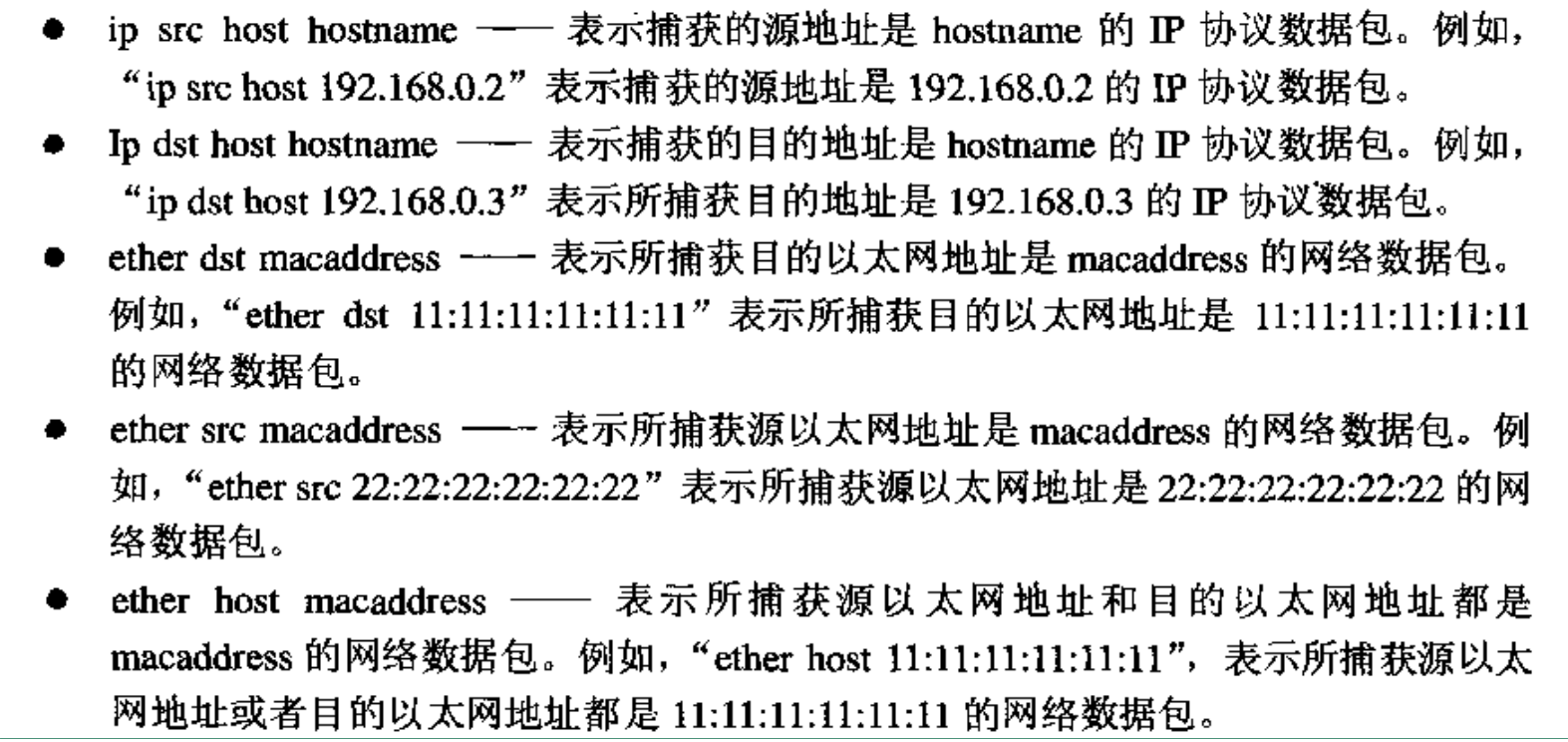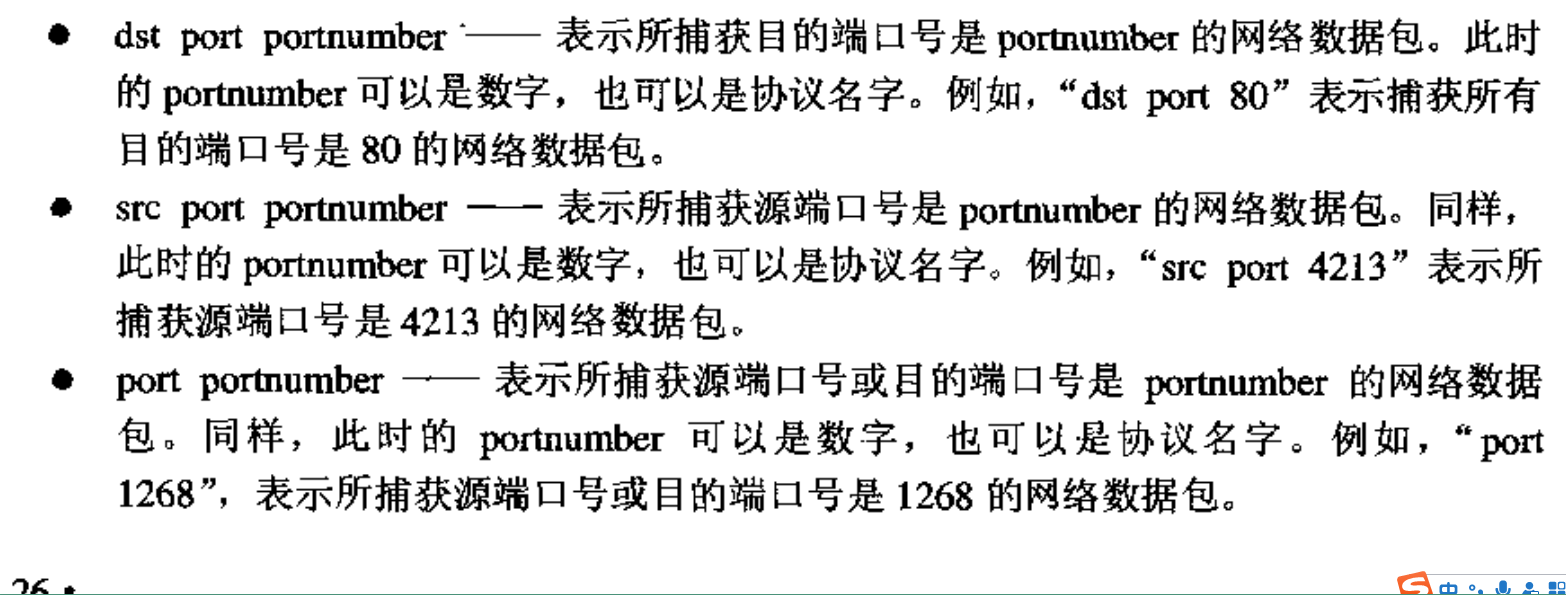1 installation
sudo apt-get install libpcap-dev
2 use
Header files to include:
#include <pcap.h
When compiling, you need to add:
-lpcap
The basic steps of developing applications using libpcap function library:
- Open network device
- Set filtering rules (optional)
- Capture data
- Turn off the network device
Common functions:
- pcap_lookupdev() (optional) view the device name and return the network card name
- pcap_t *pcap_open_live(const char *device,int snaplen,int promisc,
int to_ms,char *ebuf)
Function:
Open a network interface for capturing data
Return value:
Returns a Libpcap handle
Parameters:
device: the name of the network interface
snaplen: the length of the capture packet
promise: 1 stands for hybrid mode and other non hybrid modes
to_ms: waiting time
ebuf: store error information - void pcap_close(pcap_t *p)
Function:
Close the Libpcap operation and destroy the corresponding resources
parameter
p: Libpcap handle to close
Return value:
nothing - const u_char *pcap_next(pcap_t *p,struct pcap_pkthdr *h)
Function:
Capture a network packet
Parameters:
p: Libpcap handle
h: Packet header
Return value:
The address of the captured packet
struct pcap_pkthdr structure information: records the time of receiving data and the length of the message - int pcap_loop(pcap_t *p,int cnt,pcap_handler callback,u_char *user)
Function:
Capture network packets circularly until errors are encountered or exit conditions are met;
Each time a packet is captured, the callback function indicated by callback will be called,
Therefore, packet processing can be performed in the callback function
Return value:
0 is returned for success and a negative number is returned for failure
Parameters:
p: Libpcap handle
cnt: Specifies the number of captured packets. If it is - 1, it will be captured endlessly
Callback: callback function
user: the parameter passed to the callback function
Callback function definition:
void callback(u_char *arg, const struct pcap_pkthdr *packet_header, const u_char *packet_content)
Parameter 1: arg stores pcap_ user data passed from loop
Parameter 2: packet_heaher stores the time and length of the received message
Parameter 3: packet_content received network frame data
Filter rule function: - int pcap_compile(pcap_t *p,struct bpf_program *program,
char *buf,int optimize,bpf_u_int32 mask)
Function:
Compiling BPF filter rules
Return value:
0 is returned for success and - 1 is returned for failure
Parameters:
p: Libpcap handle
program: bpf filtering rules (pcap identified rules)
buf: filter rule string (user recognized rule center of gravity)
Optimize: optimize
mask: mask - int pcap_setfilter(pcap p,struct bpf_programfp)
Function:
Set BPF filter rules
Return value:
0 is returned for success and - 1 is returned for failure
Parameters:
p: Libpcap handle
fp: BPF filter rule
Filter rules:



3 examples
#include <iostream>
#include <pcap.h>
using namespace std;
//Callback function definition
void pcapCallback(u_char*arg, const struct pcap_pkthdr* header, const u_char* msg)
{
printf("Message length:%u\tcaplen=%u\n",\
header->len,header->caplen);
char srcMac[18] = "";
char dstMac[18] = "";
sprintf(dstMac,"%02x:%02x:%02x:%02x:%02x:%02x",\
msg[0],msg[1],msg[2],msg[3],msg[4],msg[5]);
sprintf(srcMac,"%02x:%02x:%02x:%02x:%02x:%02x",\
msg[6],msg[7],msg[8],msg[9],msg[10],msg[11]);
printf("%s-->%s\n",srcMac,dstMac);
}
int main(int argc, char *argv[])
{
char* interface = pcap_lookupdev(NULL);
cout << interface << endl;
char error[4096]="";
pcap_t *pcaphd = pcap_open_live(interface,65535,0,0,error);
if(error == NULL)
{
cout<< error << endl;
}
struct bpf_program bpf;
pcap_compile(pcaphd,&bpf,"src host 192.168.123.249",0,0xffffff00);//255.255.255.0
pcap_setfilter(pcaphd,&bpf);
//Will block
pcap_loop(pcaphd,5,pcapCallback,NULL);
if 0
/*Here is an example of receiving a packet*/
struct pcap_pkthdr header;
//The obtained msg is unpacked according to the Ethernet frame format and will be blocked
const unsigned char* msg = pcap_next(pcaphd,&header);
printf("%u\n",header.caplen);
printf("%u\n",header.len);
char srcMac[18] = "";
char dstMac[18] = "";
sprintf(dstMac,"%02x:%02x:%02x:%02x:%02x:%02x",\
msg[0],msg[1],msg[2],msg[3],msg[4],msg[5]);
sprintf(srcMac,"%02x:%02x:%02x:%02x:%02x:%02x",\
msg[6],msg[7],msg[8],msg[9],msg[10],msg[11]);
printf("%s-->%s\n",srcMac,dstMac);
#endif
pcap_close(pcaphd);
return 0;
}
reference resources:
https://blog.csdn.net/G_Super_Mouse/article/details/103748900